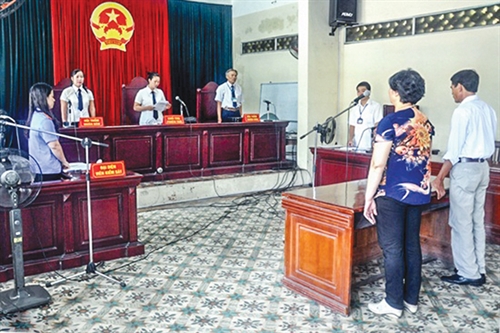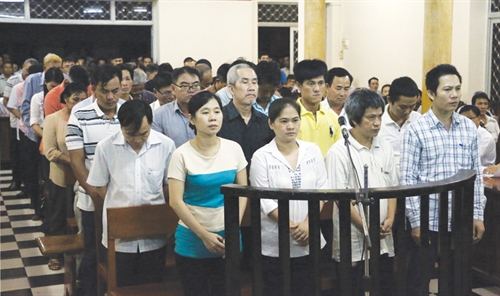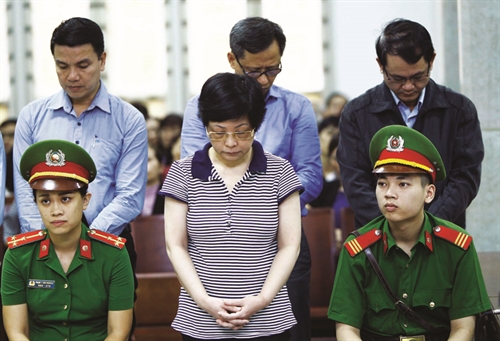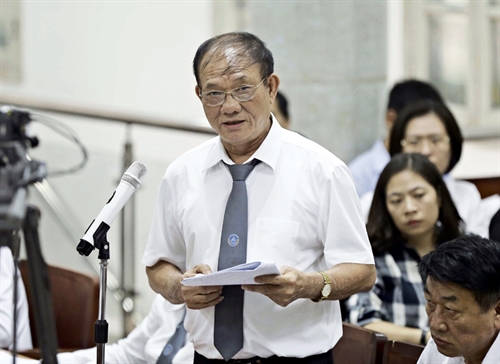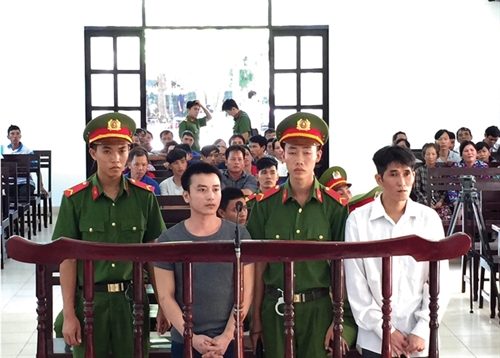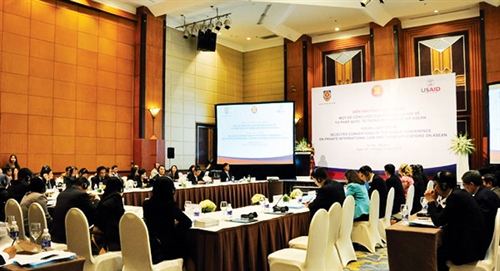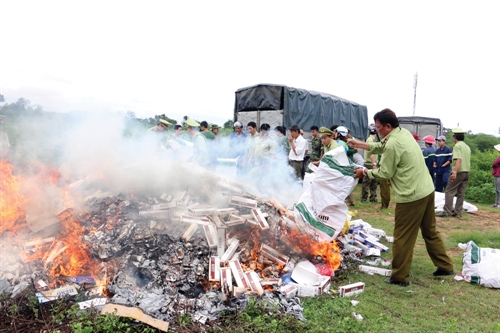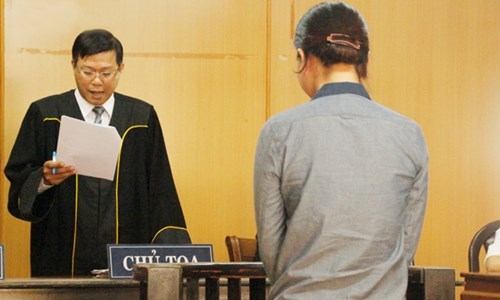This article summarizes significant changes in the 2015 Penal Code and its revisions in 2017, including penalizing commercial legal persons for committing certain crimes, scrapping the crime of illegally doing business, and criminally charging corruption-related offenders in the private sector.
Assoc Prof., Dr. Nguyen Hoa Binh
Chief Justice of the Supreme People’s Court
Penalty-related changes
Penal Code 100/2015/QH13 (the Code) dated November 27, 2015, as amended by Law 12 of 2017, took effect from January 2018. Consisting of three parts and 426 articles, it further institutionalizes the Party’s policy on application of more community or non-custodial penalties instead of imprisonment ones.
Notably, it allows imposing fine as a single principal penalty on offenders of less serious or serious crimes. For crimes infringing upon the economic management order and environmental crimes, fine may be imposed as a principal penalty even for very serious crimes.
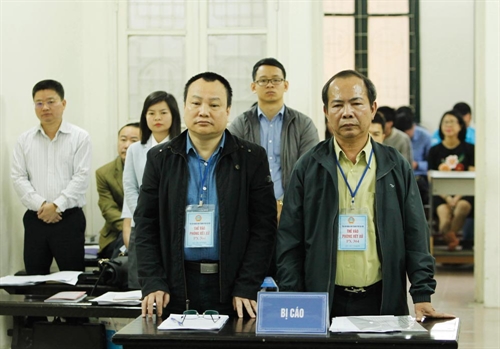 |
| Defendants Bui Van Khen (right), former director of the financial leasing company under the Bank for Investment and Development of Vietnam (BIDV) and Nguyen Viet Hung, a former BIDV official, at the first-instance court hearing for economic management violations__Photo: Lam Khanh/VNA |
It also expands the application of the non-custodial reform penalty. Accordingly, in case a person sentenced to non-custodial reform has no job or loses his job while serving the penalty, he will have to perform community service for up to four hours a day and five days a week. However, community service is not applicable to old and weak persons and pregnant women.
It affirms that termed imprisonment penalty will not be imposed on first-time, unintentional offenders of less serious crimes who have a clear place of residence. As a result, over 30 penalty clauses in the Part on Crimes do not apply imprisonment penalty compared to only six clauses in the 1999 Penal Code.
In light of the 2013 Constitution which purports to limit the imposition of the death penalty, the Code clearly articulates that the death penalty is a special one only imposed on offenders of particularly serious crimes infringing upon national security or human life, drug- or corruption-related crimes or other particularly serious crimes prescribed by the Code.
It also states that persons who are 75 years or older when committing a crime or being convicted are not punishable to death. A convict who is sentenced to death for embezzling property or taking bribes will not be executed if he, after being sentenced, voluntarily returns at least three-quarters of the embezzled property or taken bribes and actively cooperates with related authorities in detecting, investigating or handling crimes, or performs a feat.
In sum, the death penalty has been abolished for another eight crimes, including:
• Plundering property (Article 168);
• Producing or trading in counterfeit foods, foodstuffs or food additives (Article 193);
• Illegally stockpiling narcotics (Article 249);
• Appropriating narcotics (Article 252);
• Destroying important national security works, establishments and facilities (Article 303);
• Disobeying orders (Article 394);
• Surrendering to the enemy (Article 399)
• Banditry (as this crime is removed from the Code).
The Code still retains the death penalty for 18 crimes out of total 314 crimes.
Changes to help better protect human rights and citizens’ rights
The Code spells out specific conditions for early release in order to give imprisoned persons who show repentance and improvements a chance to early return to their families and further reform themselves.
Changes are also seen in the provisions on the crimes against human life, health, dignity or honor (Chapter XIV) and crimes infringing upon human freedoms or citizens’ freedoms or democratic rights (Chapter XV) with a view to better protecting human rights and citizens’ rights in the spirit of the 2013 Constitution.
Under the Code, acts infringing upon the right to vote when the State holds a referendum or the right to freedom of speech, freedom of press, access to information or demonstration is now punishable as a criminal act. Offenders of crimes against human freedoms and citizens’ democratic rights will also face harsher penalties.
Leniency for juvenile delinquents
In order to guarantee the best interests of juvenile offenders, the Code specifies 28 crimes for which a person aged between full 14 years and under 16 years may bear penal liability only in case he commits them in a very serious or particularly serious manner. These crimes fall into four groups: (i) crimes against human life, health, dignity or honor, (ii) crimes infringing upon ownership, (iii) narcotics-related crimes, and (iv) crimes infringing upon public safety.
The Code sets specific conditions for juvenile offenders aged between full 14 years and under 16 years and those aged between full 16 years and under 18 years to be exonerated from penal liability. Juvenile offenders who are exonerated from penal liability will now be applied with three educational measures, including reprimand, reconciliation, and education in their commune, ward or township.
Penal liability of enterprises
The Code prescribes for the first time penal liability of commercial legal persons. This groundbreaking move aims to inhibit and more strictly handle violations of legal persons, especially in economic and environmental sectors, and at the same time better protect the interests of people infringed upon by legal persons.
While adding 16 new crimes to help effectively fight violations against the economic management order, the Code also decriminalizes four acts, namely illegally doing business, making false reports in economic management, violating the regulations on grant of industrial property protection titles, and illegally using reserve funds to supplement charter capital of credit institutions, which were punishable as crimes under Articles 159, 167, 170 and 178 of the 1999 Penal Code. This change aims to ensure the freedom and autonomy of production and business entities. Besides the four aforesaid acts, the Code decriminalizes other two acts, namely organizing or entering into underage marriage and failing to execute administrative decisions on sending offenders to education or medical treatment establishments or administrative probation.
The Code also concretizes criminal acts causing environmental pollution, imposes heavier fines as principal and additional penalties for these crimes, and adds two new environment-related crimes: violating regulations on irrigation work and dike safety protection and natural disaster prevention and control, and violating regulations on protection of river banks.
More circumstances for exclusion of penal liability
Under the 1999 Penal Code, there are four cases where an offender is not required to bear penal liability, including unexpected events, legitimate self-defense, urgent circumstances, and the state of having no penal liability capacity. The Code now adds three more cases: (i) causing damage while arresting other offenders; (ii) taking risks in research, testing or application of scientific, technical or technological advances; and (iii) executing orders of commanders or superiors. These new provisions aim to encourage people to actively participate in the crime prevention and combat as well as production and scientific research activities for the community interest.
More specific economic crimes
The Code replaces the crime of deliberately acting against the State’s regulations on economic management causing serious consequences prescribed in Article 165 of the 1999 Penal Code with nine specific crimes in the field of economic management[1]* in addition to revising 15 crimes of intentionally-acting-against-regulations nature in Chapter VI of the 1999 Penal Code on crimes infringing upon the economic management order.
Changes to intensify corruption fight
The Code adds provisions on non-application of the statute of limitations for punishing acts of embezzling property and taking bribes committed as particularly serious crimes (Clauses 3 and 4 of Articles 353 and 354). The scope of handling corruption crimes is expanded to the private sector. Accordingly, persons with positions and powers in non-state enterprises or organizations who commit the aforesaid acts will now face criminal punishment (Clause 6 of Articles 353 and 354).
In addition, those who give bribes or act as intermediaries in bribery to foreign public employees, employees of international organizations, persons with positions and powers in non-state enterprises or organizations will also face criminal charges under Articles 364 and 365. These new provisions aim to implement the relevant provisions of the 2003 UN Convention against Corruption to which Vietnam is a contracting party.
Quantification of aggravating circumstances
The Code has quantified most of the aggravating circumstances of qualitative nature provided in the 1999 Penal Code, such as causing serious consequences, very serious consequences or particularly serious consequences; large, very large or particularly large number/volume; earning large, very large or particularly large illicit profits; large, very large or particularly large land areas; and large, very large and particularly large value.
Incorporation of relevant international conventions against crime
In order to enhance international cooperation against crime, the Code contains revised provisions on preparation for crime commission which add the act of forming or joining a criminal gang in preparation for commission of a crime, in addition to searching for and preparing tools and means or creating other conditions for crime commission (Article 14). This will help early prevent crimes from the preparation stage in the spirit of the UN Convention against Transnational Organized Crime.
It substantially revises the factors constituting the crimes of human trafficking and trafficking in under-16-years children in tune with the Protocol to Prevent, Suppress and Punish Trafficking in Persons, especially Women and Children, which supplements the UN Convention against Transnational Organized Crime.
It also adds two crimes of taking hostages (Article 301) and piracy (Article 302) on the basis of provisions of the 1979 UN Convention against the Taking of Hostages and the 1982 UN Convention on the Law of the Sea.
In response to the requirements and recommendations of the Financial Action Task Force on Money Laundering, the Code revises provisions on the crime of money laundering, criminalizing money-laundering acts of commercial legal persons (Clause 6, Article 324).-

